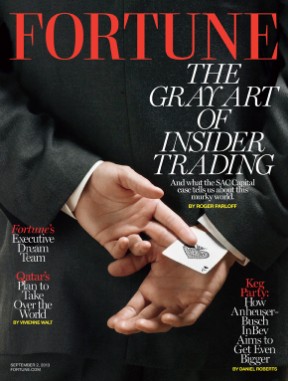Not every business practice can be neatly classified as either ethical or immoral. A recent article published on Fortune by Roger Parloff discusses the current issue of insider trading in the US. Whenever a shareholder trades stocks “based on material nonpublic information” (Parloff, 2013), he is participating in insider trading. Nevertheless, there is actually no federal statute directly addressing this practice. As much as insider trading is often ethically grey, the regulations regarding it are just as murky.

Fortune Magazine Cover
The question becomes: where does ambitious research end and insider trading begin? It’s imperative to keep in mind that analysts are always searching for competitive advantages against rivaling firms. While not all of them would dare to blatantly and illegally procure non-public material from corporate executives, some do seek out, say, ordinary employees for casual feeds. And in a sense they must, or else they risk losing their edge against more aggressive competitors.
We argue that these analysts seem to be gaining unfair advantages, but realistically, aren’t all advantages “unfair” to a certain extent? So long as they don’t step into the illegal realm of true insider trading, who are we to question their judgements on ethicality?